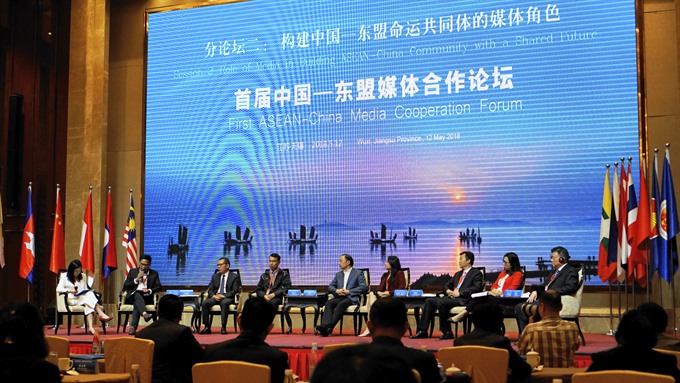 World
World

Media from ASEAN countries and China “can choose to build bridges of understanding or create walls of misinformation” at a time when the multidimensional partnership between the two sides is scaling new heights, said ASEAN Deputy Secretary-General.
 |
| Delegates representing major media outlets from China and ASEAN countries during a discussion at the first ASEAN-China media co-operation forum, held over the weekend in the eastern city of Wuxi, Jiangsu Province, China. — VNS Photo Trọng Kiên |
WUXI, Jiangsu, China — Media from ASEAN countries and China “can choose to build bridges of understanding or create walls of misinformation” at a time when the multidimensional partnership between the two sides is scaling new heights.
This was said by A.K.P. Mochtan, Deputy Secretary-General of ASEAN Secretariat, during his keynote speech in the first ASEAN-China media cooperation forum held during the weekend.
He urged the media to put ample focus on helping people from both sides realise that “there are opportunities for everyone under each and every area of cooperation, be it in the field of agriculture, tourism, health, education or trade”.
The forum, attended by nearly 100 journalists, officials and academia members from Southeast Asian countries and China, was organised in the year marking the 15th anniversary of the two sides’ strategic partnership in a market of nearly two billion people combined.
The forum, as ASEAN-China Centre Secretary-General Yang Xiuping put it, “aims to create a new platform for media exchanges and cooperation” under this year’s ASEAN’s theme of innovation, set by Singapore as the rotating chair.
Xiuping said the media from both sides should “redouble their efforts” to garner public support for the development of ASEAN-China relations, by “spreading positive energy for friendly cooperation,” harnessing the power of technology and creating long-term mechanism for exchanges.
Media representatives agreed that there were abundant opportunities for collaboration as ASEAN and China had been each other’s largest trade partners for several years.
However, the growing trends of protectionism and rampant fake news and hate speeches were posing new challenges that might undermine the relationship.
“Media plays an important role in raising people’s awareness and understanding and helps to correct any misconceptions about each other,” said Lu Cairong, Vice President of China International Publishing Group, the largest foreign language publisher in the China.
Han Yong Hong, from Singapore’s major Chinese-language newspaper Lianhe Zaobao, however, urged “fair, clear, and unbiased reporting, and without predisposition” to inform the leaders and the public, all in serving of “healthy discussions on future development".
Atman Ahdiat, the manager of the International Affairs Desk from the Indonesia State-run Antara News Agency also shared the sentiment, citing hoaxes and hate speech case in Indonesia’s 2018 election year as potential threat to the unity of the ethnically diverse country.
The fast growth of social media at the expense of traditional media was also discussed at the forum, with media organisations from both sides agreeing on the need to re-establish their influence by applying new technologies, including Big Data, cloud technology and virtual reality, as well as harnessing the potential of social media instead of fighting against the inevitable.
At the forum, delegates suggested a mutual database as well as a sharing mechanism to utilise resources created amongst media organisations in China and ASEAN to facilitate better-quality news and stories, and support each other in terms of human resources’ capacity building and media convergence.
The setting up of the ASEAN-China Centre, with its Secretariat based in China’s capital Beijing, was signed in 2009 between 10 ASEAN members and China and was officially established two years later as a “one-stop information and activities centre” to advance collaboration between the two sides in various areas. In 2017, another centre was opened in Manilla, the Philippines. — VNS




